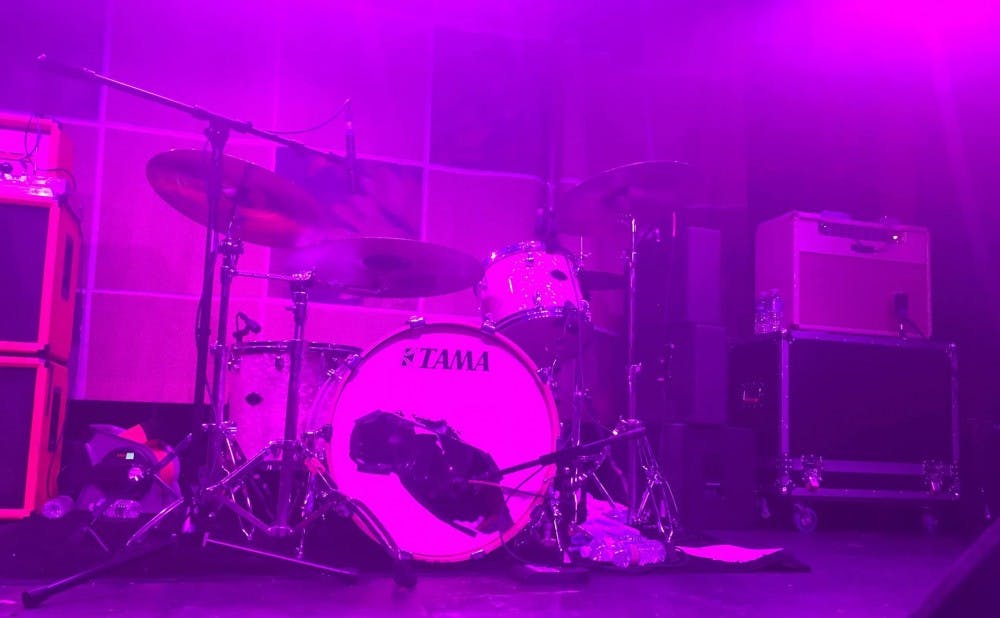I first saw Touché Amoré perform in July 2014. They played to a sweaty crowd packed tightly into a venue with a broken air conditioner and a dip in the center of the hardwood floor, the cumulative result of too many circle pits. This past Tuesday, I saw them perform once again — this time, at Durham's Motorco Music Hall. Despite Touché’s growing success since that 2014 show and Motorco’s comfortable, well-conditioned air, by the time the band took the stage the venue was just over half full. Sandwiched between sold-out shows in Orlando and Philadelphia (not to mention Austin, Toronto and Chicago), I was surprised that the band’s first Durham performance in their nearly ten-year career hadn’t attracted a larger audience.
A post-hardcore band from Los Angeles, Touché Amoré’s music maintains the pace, severity, and aggression of traditional hardcore while exploring a diverse range of topics in their lyrics — both deeply personal and surprisingly universal. From struggles with social anxiety and the ups and downs of life on the road to the fragility of life and the impermanence of art, Touché isn’t afraid to open themselves up. The band’s fourth and most recent album, “Stage Four” (2016), maintains the honesty and empathy their lyrics are known for. The record chronicles lead singer Jeremy Bolm’s mother’s battle with cancer and her passing while the band was on tour.
At first I thought the shallow turnout was the result of a lack of interest — perhaps a flourishing punk scene just doesn’t exist in Durham. But, having been to well-attended shows at The Pinhook and elsewhere in the Triangle area, this didn’t seem to be the case. Just two summers ago I saw La Dispute, Touché Amoré’s sonic counterpart, perform at the Fillmore in Raleigh, an event that 147 people said they attended via Facebook. While waiting for the doors to open this past Tuesday — a position I often find myself in due to my obsessive need to be first in line for any show I attend — I met a fellow follower who drove from Charlotte to see the show. I wondered, where were all of the other dedicated fans?
My frustration at the low attendance should not be mistaken for a discontent with the performance. In fact, despite the small crowd, the band brought just as much energy as they did when I saw them play to a full house three years ago: frontman Bolm hopped, jumped and ran across stage, too quickly for me to capture an image of him that wasn’t blurry. He even joined Single Mothers, one of three opening bands on the bill, on stage for a guest vocal appearance. The band’s songs, short and fast, ran together seamlessly, without so much as a pause or a chance to catch your breath. The band has been working from a rotating setlist, including a healthy mix of new tracks from “Stage Four” and older crowd favorites like “Just Exist” and “~.” They even ventured so far as to play “Skyscraper,” an anomalous track that features singer-songwriter and former label mate Julien Baker alongside Bolm’s own singing (yes, singing).
I am convinced that shows like Touché Amoré’s this past Tuesday just aren’t promoted to the extent that other, seemingly more popular shows are. Prior to the performance, I scoured Duke’s campus for any sign of the upcoming show and found only one: a single flyer stapled to a hidden pillar in the Bryan Center. On the walk from campus to Motorco, I saw no advertisements for the concert at all. This is all well and good for people who know the bands playing these shows, people who actively follow them and record their upcoming tour dates. However, casual listeners and those who are interested in discovering new music never find out about these shows. Even though Motorco hosts a wide variety of musical groups from every genre imaginable, the advertisements that find themselves in areas of especially high traffic are ones that are already inherently more popular.
Smaller bands from more marginalized genres depend on touring and merchandise sales to make a profit (though, most of the time, they’re simply breaking even). These are the events that should be more widely promoted. I have seen with my own eyes the hardcore community in Durham, and it is small, but thriving.
Get The Chronicle straight to your inbox
Sign up for our weekly newsletter. Cancel at any time.

